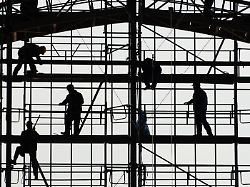Paradoxical situation
How is the German economy really doing?
By Max Bourne
March 5, 2024, 7:21 p.m
Listen to article
This audio version was artificially generated. More info | Send feedback
Is the economy in crisis? The economics minister himself calls the situation “dramatically bad.” However, many people are not feeling this at the moment. Inflation is falling, wages are rising. The crisis development of the past few years has turned into its opposite.
Germany’s economy is doing brilliantly, right? The German economy has just overtaken Japan in terms of annual output and is now the third largest in the world. The leading index of the German stock exchange, the DAX, is climbing from one all-time high to the next. The Federal Employment Agency is constantly reporting new employment records in the labor market. At the same time, inflation has fallen almost to the European Central Bank’s target, while wages are rising sharply.
However, something is going wrong with the German economy. Not only are the political opposition and business associations dissatisfied, but even Robert Habeck, the responsible minister, described the economic situation as “dramatically bad.” Habeck had to lower the growth forecast for this year to just 0.2 percent on behalf of the federal government. Last year, Germany’s economic output even shrank slightly. When it comes to growth, Germany is one of the worst performers in Europe. On closer inspection, Germany’s economy has not so much overtaken Japan’s as it has fallen behind Germany’s, partly in purely mathematical terms due to the weak development of the Japanese currency, the yen.
So how is the German economy really doing? There is no simple answer to this question. For many people in Germany, the economic situation has recently improved again after the Corona crisis and after the energy crisis in the wake of Russia’s war of aggression against Ukraine. The situation on the labor market is stable. Falling inflation and rising wages led to a slight increase in the purchasing power of many people.
Electricity prices fall below pre-crisis levels
In particular, energy prices, which have since exploded, have fallen back to the level of more than two years ago. This not only benefits private consumers, but also companies from chemical companies to bakers, who particularly suffered from the high gas bills. Due to reduced taxes and duties for some companies, electricity prices are currently significantly below pre-crisis levels. But while the costs for companies are falling or at least not rising as much, the economy now has another problem: demand is disappearing in many industries.
This means that the crisis development of the past few years has been reversed. The construction industry, mechanical engineering, car manufacturers: They all suffered from the fact that energy, raw materials and intermediate products were scarce and expensive or, in some cases, no longer available at all. Production and therefore the supply of goods could not keep up with demand. Now it is increasingly the other way around.
This development can be observed particularly drastically in construction. According to a study by the German Institute for Economic Research (DIW), spending on construction services is expected to fall by 3.5 percent last year, and by as much as 5.4 percent in housing construction. The construction industry is particularly sensitive to the key interest rates, which rose at a record pace in 2022 and 2023. This makes mortgages and other loans that property developers usually use to finance their investments more expensive.
Reasons for weak demand remain
The construction industry is not the only one that recently struggled to keep up with demand, but is now left with empty order books. According to Eurostat, capacity utilization in German industry has fallen to a good 80 percent, the lowest value since the peak of the Corona crisis. Industrial companies are primarily feeling a decline in demand from abroad. In 2023, German exports fell by 1.8 percent after adjusting for prices. While the federal government expects a stabilization this year, other forecasts predict a further decline.
And how does it continue? The main reasons for weak demand – increased interest rates and the weak global economy – are unlikely to change in the near future. The contradictory situation in the German economy with stable prices and rising incomes combined with stagnating economic performance is likely to continue.
